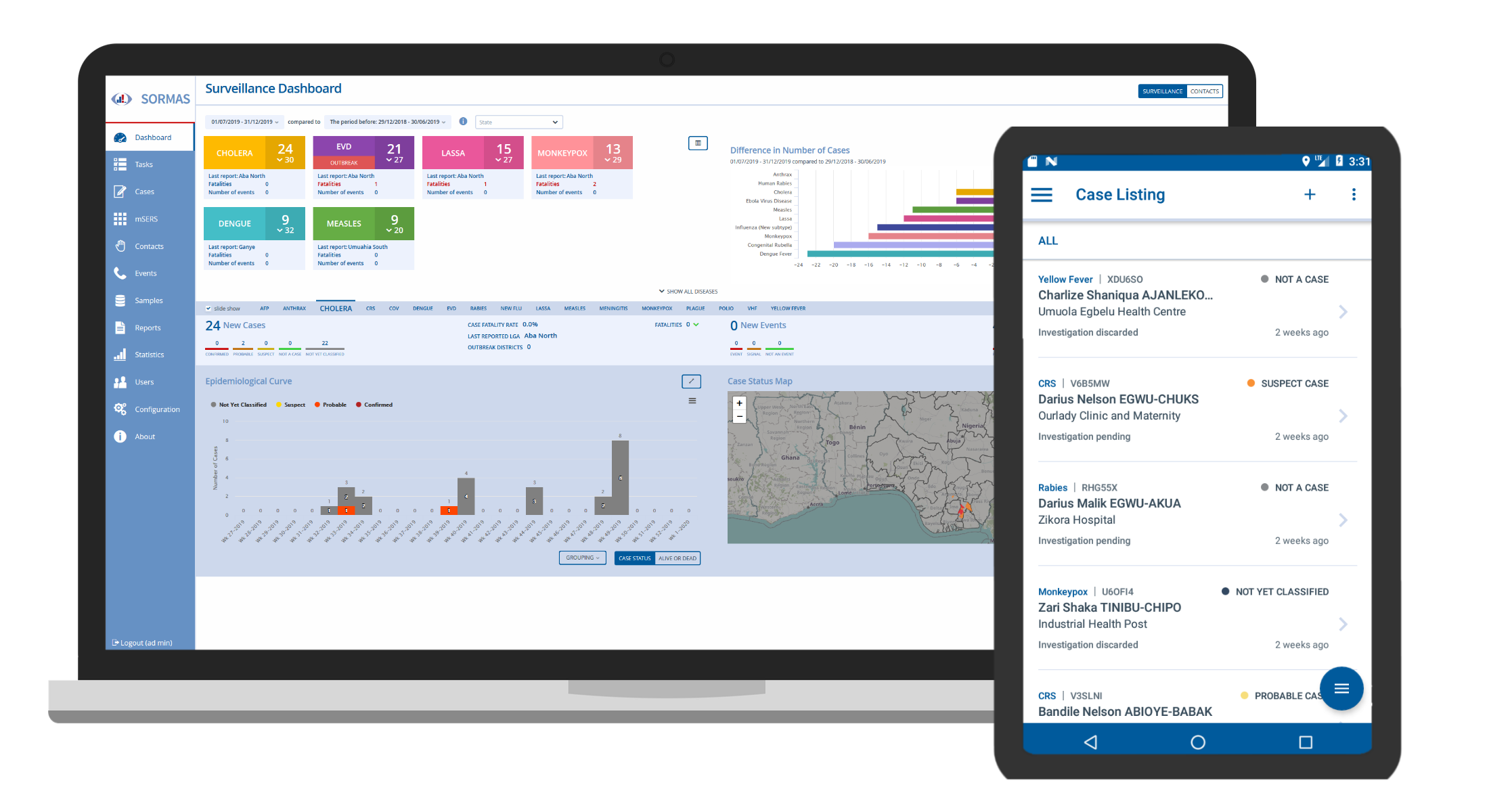SORMAS (Surveillance Outbreak Response Management and Analysis System) is an open source eHealth system - consisting of separate web and mobile apps - that is geared towards optimizing the processes used in monitoring the spread of infectious diseases and responding to outbreak situations.
You can give SORMAS a try on our demo server at https://demoversion.sormas-oegd.de!
Read through our Contributing Readme and contact us at [email protected] or join our developer chat on Gitter to learn how you can help to drive the development of SORMAS forward and to get development support from our core developers. SORMAS is a community-driven project, and we'd love to have you on board! If you want to contribute to the code, please strictly adhere to the Development Environment guide to ensure that everything is set up correctly. Please also make sure that you've read the Development Contributing Guidelines before you start to develop, and either follow or regularly check our Twitter account @SORMASDev to stay up to date with our schedule, new releases, guideline changes and other announcements.
If you want to report a security issue, please read and follow our Security Policies. For bugs without security implications, change and feature requests, please create a new issue and read the Submitting an Issue guide for more detailed instructions. We appreciate your help!
SORMAS officially supports and is tested on Chromium-based browsers (like Google Chrome) and Mozilla Firefox, and all Android versions starting from Android 7.0 (Nougat). In principle, SORMAS should be usable with all web browsers that are supported by Vaadin 8 (Chrome, Firefox, Safari, Edge, Internet Explorer 11; see https://vaadin.com/faq).
Making use of the SORMAS web application through a mobile device web browser is possible and acceptable also in countries that are subject to the General Data Protection Regulation (GDPR) as enforced by the European Union. However, in such countries that are subject to the GDPR, the Android application (.apk file) for SORMAS should not be used on mobile devices until further notice.
Yes! Please download the latest release and copy the content of /deploy/openapi/sormas-rest.yaml to an editor that generates a visual API documentation(e.g. https://editor.swagger.io/).
A runtime Swagger documentation of the External Visits Resource (used by external symptom journals such as CLIMEDO or PIA) is available at <<host>>/sormas-rest/openapi.json or <<host>>/sormas-rest/openapi.yaml
If you want to learn more about the development and contribution process, setting up or customizing your own system, or technical details, please consider the following guides and resources available in this repository. You can also view this readme and all guides outside the Wiki with a full table of content and search functionality here: https://hzi-braunschweig.github.io/SORMAS-Project/
- GitHub Wiki - Our wiki contains additional guides for server customization and development instructions. Please have a look at it if you need information on anything that this readme does not contain.
- Contributing Guidelines - These are mandatory literature if you want to contribute to this repository in any way (e.g. by submitting issues, developing code, or translating SORMAS into new languages).
- Development Environment Setup Instructions - If you want to get involved with development, this guide tells you how to correctly set up your system in order to contribute to the code in adherence with codestyle guidelines, development practices, etc.
- Troubleshooting - A collection of solutions to common (mostly development) problems. Please consult this readme when encountering issues before issuing a support request.
- Server Customization - If you are maintaining a SORMAS server or are a developer, this guide explains core concepts such as turning features on or off, importing infrastructure data or adjusting the configuration file.
- Internationalization - SORMAS can be translated in any language by using the open source tool Crowdin; this resource explains how this process is working.
- Disease Definition Instructions - We already support a large number of diseases, but not all of them are fully configured for case-based surveillance, and some might not be part of SORMAS at all yet; if you need SORMAS to support a specific disease, please use these instructions to give us all the information we need in order to extend the software with your requested disease.
- Security Policies - These contain important information about how to report security problems and the processes we are using to take care of them.
- 3rd Party License Acknowledgement - This resource contains the names and license copies of external resources that SORMAS is using.
If you want to set up a SORMAS instance for production, testing or development purposes, please refer to the following guides:
- Installing a SORMAS Server
- Installing a SORMAS Server for Development
- Updating a SORMAS Server
- Creating a Demo Android App
The project consists of the following modules:
- sormas-api: General business logic and definitions for data exchange between app and server
- sormas-app: The Android app
- sormas-backend: Server entity services, facades, etc.
- sormas-base: Base project that also contains build scripts
- sormas-base/dependencies: Dependencies to be deployed with the payara server
- sormas-cargoserver: Setup for a local dev server using maven-cargo
- sormas-e2e-performance-tests: Automated performance tests addressing the ReST interface (sormas-rest)
- sormas-e2e-tests: Automated frontend tests addressing sormas-ui and API tests against sormas-rest. The API steps are partly used to prepare data for UI tests.
- sormas-ear: The ear needed to build the application
- sormas-keycloak-service-provider: Custom Keycloak SPI for SORMAS
- sormas-rest: The REST interface; see
sormas-rest/README.md - sormas-ui: The web application
- sormas-widgetset: The GWT widgetset generated by Vaadin
- sormas-e2e-tests: Automated tests addressing the sormas-ui, and the ReST interface




